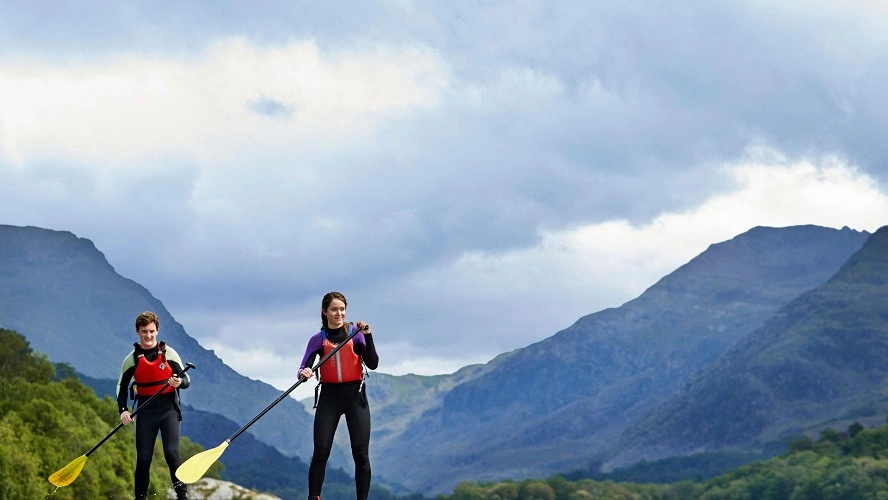
Adventure Sport Science
Overview
The BSc (Hons) in Adventure Sport Science is comes to provide students with a strong foundation in sports science to the world. It's a unique and comprehensive programme designed to offer the knowledge, skills, and experiences necessary to excel in the field of adventure sports and science. This programme combines academic study with practical training to prepare students for a rewarding career in adventure-related industries.
Objectives
- Develop students' understanding of scientific principles.
- Enhance coaching skills for diverse adventure activities.
- Foster leadership qualities and teamwork skills.
- Prepare students for successful careers in adventure sports.
- Develop critical thinking and problem-solving skills.
Prerequisites
- A passion for sports science and adventure sports.
- A strong interest in science and the human body.
- Good physical and mental health.
- Basic understanding of science subjects (biology or physical education recommended).
Curriculum Outline
- Adventure Sports Physiology
- Adventure Sports Psychology
- Integrating Physiology
- Biomechanics of Adventure Sports
- Coaching Principles and Methods
- Leadership and Team Development
- Risk Management and Safety
- Adventure Sports Nutrition
- Environmental Science
- First Aid and Emergency Procedures
- Practical Training and Field Experiences
Teaching Method
- A combination of lectures, seminars, workshops, practical sessions, and lab work.
- Experienced instructors with expertise in adventure sports and science.
- Opportunities for hands-on learning and skill development.
- Practical fieldwork and outdoor training sessions in real adventure environments.
Modules
- Land-based Skills & Group Man
- Practical Paddlesport skills
- Human Physiology
- Found Sport/Exercise Psychology
- Professional Life Skills
- Scientific Writing & Comm I
- Scientific Writing & Comm II
- Research Methods 1
- Research Methods 2
- Advanced rope work & leader
- Paddlesport Coaching & Leader
- Sport Psych/Theory/Applic
- Sport & Ex Phys
- Research Expedition
- Research Methods III
- Research Methods IV
- Environmental Physiology
- Adventure Tourism
- Outdoor Adventure Therapy
- App SS Elite Perf
- Exercise for Health
- Personality & Individual Diff
- Stress and Performance
- Applied Psychological Interven
- Psychophysiology of Sport
- Psychophysiology of Eating
- Advanced S&C
Assessment Methods
- Written examinations
- Lab reports and coursework
- Practical performance assessments
- Group projects and case studies
- Presentations and reflective journals
Course Duration
This programme may vary depending on the institutions and countries, but the general standard options in the UK are:
- 03 Years full-time
Facilities
- £1M teaching lab
- An altitude (hypoxia) chamber
- Multiple 3D motion analysis labs
- A dual-energy X-ray absorptiometry (DXA) whole body scanner
- Exercise testing and rehabilitation labs
- An environmental chamber
- Psychology, psychomotor and psychophysiology testing suites
- Biochemistry and cell biology labs
- 3 x Psychomotor control/testing labs
- Psychology testing labs
- 1 x Driving simulator lab
- 1 x Live-in/Social Psychology lab
- 1 x Water immersion testing lab
Career Pathways
- Sports scientists
- Adventure sports trainers
- Outdoor leaders
- Performance analysis
Fees and Fundings
- Tuition fees are around £18,000 per year.
- Scholarships and financial aid may be available to help offset costs.
- Part-time work or student loans can also be considered.
Entry Requirements
- High school certificate or equivalent
- HSC (4.5 GPA or above) will be considered
- IELTS 6.0 (5.5)
Field Work and Internships
- Opportunities for practical experience in adventure sports settings.
- Partnerships with local adventure companies and organisations.
- Internship placements to gain valuable industry experience.
Certifications
- Coaching certifications
- Risk management certifications
- Exercise Physiology Certifications
- Strength and Conditioning Certifications
- Business and entrepreneurship certifications
- First aid and emergency procedures certifications
Intakes
Typically, it takes twice a year (fall and spring), but may vary like:
- Fall (September/October)
- Spring (January/February)
- Summer (May/June)
Student Testimony
"The outdoor practical days have given me opportunities I would have never had at any other university; I've been sea & white water kayaking, coasteering, rock climbing and gorge walking;" says - "Beth Harley, Adventure Sport Science".
Frequently asked questions
Key areas of study include adventure sports physiology, adventure sports psychology, biomechanics of adventure sports, coaching principles and methods, leadership and team development, risk management and safety, adventure sports nutrition, first aid and emergency procedures, and practical training and field experiences.
